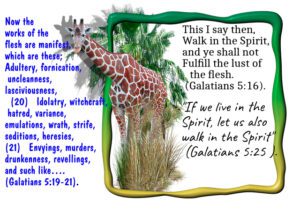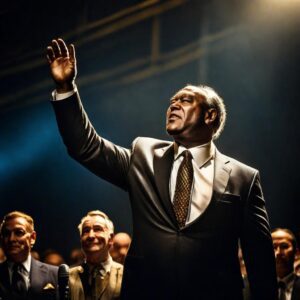Here is a GoogleLM podcast discussion of the issues presented in this article.
Part 1: BAPTIST FAILURE
I’m a Baptist. However, for about a year early in my Christian experience, I attended an Assembly of God church. It was a good experience because it taught me that there are good, godly people in the Pentecostal-Charismatic world. While I may not accept all the doctrines of that group of Christians, the core doctrines of that world, with some exceptions, is sound. But, both groups, Baptists and Charismatics, have some serious issues within their ranks. This article addresses the major problem this writer sees within the Baptist world. (In Part 2, I’ll address some serious issues I see in the Charismatic world.)
One issue I’ll address in passing, which exists within virtually all of Christianity, is the failure to protect the children within their care against sexual predators. After an event nearly occurred in my church, I even wrote a book about it (Protecting Your Church Against Sexual Predators). Much improvement has occurred in this area within all churches, but there is still a lack of real understanding of the threat posed by sexual predators.
Also, both groups, Baptists and Charismatics, instead of dealing openly with moral failures within their ranks, have too often, sought to cover it up, or sweep it under the rug. In today’s world, that has (fortunately) become almost impossible.
Who Has the Truth?
I was converted at the age of 19 after a rather miraculous intervention of my life by God. Immediately thereafter I began seeking truth. I devoured the Bible, racing through its pages, reading and rereading, and asking tossing questions to God virtually every day. I wanted to know truth–God’s truths. I also wanted to know “who” had the truth. I’d never been to church in my life (except at the age of maybe 4 or 5), nor had I listened to any kind of religious messages, nor had I read any Christian material, or any other religious material. In terms of Christianity and God, I was totally ignorant. I was a blank slate.
So, when I became a Christian, one of the first questions I tossed at God (multiple times) was  “who has the truth” in all of the denominations? I knew truth was in the Scriptures, which I was devouring. But, what church should I join? What branch of Christianity? I knew they could not all be right. Even I, in my uneducated and untrained state knew that much.
“who has the truth” in all of the denominations? I knew truth was in the Scriptures, which I was devouring. But, what church should I join? What branch of Christianity? I knew they could not all be right. Even I, in my uneducated and untrained state knew that much.
Knowing Truth Not Equal to Having Wisdom
The mere fact that a denomination has truth does not mean they (a) know how to use it; and (b) know how to disperse it; and (c) have all of it right.
God led me into the Baptist world. At the time (and for many years), I assumed Baptists had it “mostly right” and the rest had it “mostly wrong.” Fortunately, in the passage of time, due to learning to ask God for wisdom and discernment, and due to spiritual maturity, I’ve learned some extremely valuable truths about who has the truth. One thing I’ve learned is that many Baptists are sadly lacking in some vital truths of the Bible.
The Baptist world is fragmented with many different “models” and some segments have split into multiple groups, differing on this doctrine or that one, and in the structuring or governing themselves differently. Like cars, the models are endless.
They also are splintered insofar as having truth. Some have lots of truth, some have very little truth, and some seem to hold small fragments of truth–enough to make them dangerous and as incompetent as a blind man trying to lead another. However, many in the Baptist world have some very good foundational truths which I have adopted and hold fast.
Baptists Have Scholars of Renown
Baptist are famous for their scholarly achievements and have produced some very astute scholars. In short, the Baptist world, historically and to date, possesses some of the finest and well-trained minds within Christianity. Some of the most brilliant minds within Christendom have come from within the baptistic world of Christianity.
James Petigru Boyce[1] (1827-1888) was one of the founders of the Southern Baptist Theological Seminary and served as its first president. He was an influential theologian who helped shape Southern Baptist doctrine in the 19th century. Basil Manly Jr.[2] (1825-1892) was a Baptist theologian and educator who played a key role in drafting the Abstract of Principles at the Southern Baptist Theological Seminary. He was heavily influenced by Jonathan Edwards’ writings and contributed significantly to Baptist theological education. Edwards also contributed heavily to Baptist early theology. Many of the early theologians and scholars, though not known as “Baptists” were, nonetheless, baptistic in their doctrines. More recently, the well-known Baptist, W.A. Criswell[3] (1909-2002), who pastored the First Baptist Church of Dallas, had a very strong influence on Baptist doctrine.
 But, a highly intelligent Christian who has undergone rigorous training within the walls of academia does not necessarily produce a wise Christian. It merely produces a very smart Christian who knows far more about theology than most Christians. And, it may be that it produces someone who, under forces other than God, come to conclusions about God and the truths in the Bible that are not true. Whether that individual’s theology is sound or not depends on a wide array of factors, not the least of which is whether the underlying study materials and professors really did know and understand and convey biblical truths.
But, a highly intelligent Christian who has undergone rigorous training within the walls of academia does not necessarily produce a wise Christian. It merely produces a very smart Christian who knows far more about theology than most Christians. And, it may be that it produces someone who, under forces other than God, come to conclusions about God and the truths in the Bible that are not true. Whether that individual’s theology is sound or not depends on a wide array of factors, not the least of which is whether the underlying study materials and professors really did know and understand and convey biblical truths.
Moreover, were the truths espoused and passed on by these theologians actually biblical truths? Were they inspired of the Holy Spirit, or something else? These questions are raised by many within and without the Baptist and Charismatic world. The questioning of one’s theology is a never ending debate that reaches back to the beginnings of Christianity.
There is definitely, within many Baptist churches and sub-sets, some unsound and unwise practices that are unbiblical. They have little to do with doctrine per se. They are akin to the myriad of legalistic rules that permeated the Pharisees and the Jewish religious hierarchy. However, there are also, with the Baptist world, some biblical truths that lie moldering, untouched, unused, and with few exceptions, “unpreached.”
Also, there are some Baptists who espouse certain truths which they defend as biblical, but which I (and many other Baptists) totally reject. Their doctrinal position is, in my opinion, contrary to the truths I know and understand, truths that illuminated my mind by the Spirit of the living God living within me. In short, the Scriptures do not support their doctrine. But, this does not mean they don’t hold other core truths that I support. They do. Indeed, one of my favorite Bible teachers is within this body of believers who endorse these unbiblical doctrines.
Conclusion: The mere fact that a group of believers have doctrines that are contrary to the truth of the Bible does not make such persons worthless. Truth glistens wherever it rests and I’ve collected many nuggets of truth over the years from a wide array or sources, many who held biblically unsound doctrines.
Baptists Lack Wisdom in Some Areas
The dictionary meaning: “the quality or state of being wise; knowledge of what is true or right coupled with just judgment as to action; sagacity, discernment, or insight.”
Recently, I had a man call me a “wise man.” I forget the exact words, but the essence of it was that he believed I had a lot of wisdom. I agree. I do have a lot of wisdom. Now, lest you think I boast, you have to understand some things.
Every Christian–every single one–is supposed to be wise. We are commanded to be wise servants, wise followers of Christ. The Apostle Paul said “I would have you wise unto that which is good, and simple concerning evil” (Rom 16:19). We are to be “wise in Christ” (1 Cor. 4:10). We’re told in the book of James to ask God for wisdom (Jms 1:5). And, the book of Proverbs is replete with the call to seek wisdom. Why? Well, perhaps because God wants me…and you, to be a wise Christian?
God wants us to know and understand biblical truths about Him. Moreover, God expects us to be discerning about life, about people, about doctrine, about practices, about matters of importance and about life in general. God expects us to be wise as to how to conduct our lives in such a manner as to be pleasing to God. That means we will make wise choices and our decisions in life will reflect our wisdom.
 But, remember, the wisest man ever, Solomon, made some extremely unwise decisions in his life as he grew in power. It cost him dearly. It destroyed the nation of Israel and created a schism amongst the people of Israel that divided the nation and cost the Jewish population their freedom. Eventually, they all became slaves. Why? Because of the failure of the wisest king ever to rule Israel, or any nation, to ignore his wisdom.
But, remember, the wisest man ever, Solomon, made some extremely unwise decisions in his life as he grew in power. It cost him dearly. It destroyed the nation of Israel and created a schism amongst the people of Israel that divided the nation and cost the Jewish population their freedom. Eventually, they all became slaves. Why? Because of the failure of the wisest king ever to rule Israel, or any nation, to ignore his wisdom.
I am not the wisest of Christians, and I am also certain that I have not always properly exercised the wisdom I do possess. I’ve ignored the wisdom God has given me at times in my life. And, I have been very unwise in some decisions in life because of a lack of one or more of the elements within true wisdom. So, possessing wisdom and exercising it are two different things.
True wisdom contains an element of discernment as well as a healthy dose of understanding. If a man or woman has little or no discernment or lacks understanding, then such persons cannot be called “wise.” If a person is deemed to be a wise person but has little understanding about how to conduct his or her life in wisely, then there is little wisdom in such an individual.
Baptists Lack Wisdom in Key Areas
The Baptist world is very unwise in some areas. I’ve no plan, nor desire, to produce a “laundry list” of the views and practices of some in the Baptist world. I will discuss here, a one major area in which they display a lack of wisdom and understanding of certain truths within the Bible.
Now, don’t misunderstand me. I’m not saying all Baptists lack wisdom. I’m saying that in some areas, they lack wisdom. I’m speaking generally. There are areas that, in my humble Baptist opinion, are seriously hurting the Body of believers within that segment of Christianity.
THIS BAPTIST WEAKNESS IS PRODUCING MORAL FAILURES
This weakness is the primary reason we are seeing so many moral failures amongst male pastors in the Baptist world. Some of these failures have happened to men who have a strong biblical background, men who preached strong messages against sin. Recently, a well known Baptist preacher, a man who has been a paragon of virtue, a man who has preached against sexual sin, was relieved of his pastoral duties because of moral failure. His failure was caused by his failure to understand the truth that will be revealed in this article. It is the largest weakness in the Baptist world. And, it is wreaking havoc within the Baptist ranks.

This weakness is hard to define in just a word, or even a sentence. It involves lack of understanding of certain truths within Scripture. Baptists, with of course, some exceptions, are very weak in teaching, preaching and modeling the Apostle Paul’s admonition: “This I say then, Walk in the Spirit, and ye shall not fulfil the lust of the flesh” (Gal 5:16). He reiterated this command with “If we live in the Spirit, let us also walk in the Spirit” (Gal 5:25).
After my salvation at age 19, I spent 5 years in a Conservative Baptist Church and never one time heard a sermon or a teaching on either of those verses, or that theme. I spent nearly twenty years in an Independent Fundamental Baptist church and never one time heard a sermon or a teaching on either of those verses or that theme.
Well, let me correct myself. After I left that church, I’d been critical of it and had publicly mentioned the failure to teach or preach on walking in the Spirit. Soon after, I heard a sermon in which that pastor railed on “people who talk about walking in the Spirit and accuse us of not doing that.” He then declared that if a Christian was “soul winning” and/or working on a bus route and witnessing, then he or she was walking in the Spirit.
I spent another 37 years in a Baptist church and the pattern repeated. I never heard a single message on the subject or the theme or the verses quoted from Galatians. I’ve listened to a lot of excellent sermons in that church and by a wide array of Baptist preachers over the years, in person, by audio and video, and online, and, with the exception of Charles Stanley, I never heard any of them preach on those verses, or even stress the importance of walking in the Spirit.
Stanley regularly preached and taught on that theme, and even wrote a very excellent book on the subject.[4] Stanley was the premier proclaimer of the importance of walking in the Spirit for decades. It was the thing that attracted me to his preaching and kept me listening to him (even today, after he’s passed, via Youtube).
Early Christian Pastors Were Advocates of Walking in the Spirit
In many of the early sermons in the 1800’s there were a lot of messages about walking with God, being holy and walking in the Spirit. Many Baptists, then, ascribed to those messages.
If you read some of the messages by Ruben A. Torrey,[5] an associate of Dwight L. Moody,[6] you’ll see an emphasis on a holy life, a life not spent chasing pleasures, and separation from worldliness. Although Torrey was ordained as a Congregationalist pastor, once he joined forces with Moody in 1889, he adopted the same non-denominational position held by Moody. His doctrine, like Moody’s, was aligned with evangelical Protestantism, but also, like Moody, he preached to hundreds of thousands and saw great revivals arise during his ministry.
Torrey became the pastor of what is now the Moody Church and was head of the educational institution called the Chicago Evangelization Society begun by Moody in 1886, and which is now known as the Moody Bible Institute.[7]
Moody began as a Congregationalist, but later, when he became popular, refused to embrace a denomination. However, his doctrine aligned with evangelical Protestantism, to wit, very baptistic. Moody was very conservative in his doctrine, and was a biblical literalist. However, he avoided divisive sectarian doctrines and focused on core Christian teachings.
Moody’s personable disposition, his deliberate avoidance of conflict, coupled with a lack of training (and interest) in formal theological training kept him comfortably out of reach of the sharpening dispute between Protestant liberals and conservatives. He ruffled some feathers, but commanded the respect of all Christian leaders, including many in the Baptist world. Indeed, his model of behavior in this would be the same one demonstrated by Billy Graham, decades later. In fact his evangelism laid the foundation for the very conservative movement that would be become what we know today as Baptist Fundamentalism.
Between 1873 and 1875 Moody preached to audiences that exceeded a cumulative total of approximately three million. Moody’s British revivals attracted attention around the world. He began a long series of revivals during the 1870s and 1880s that involved virtually every major American city. Torrey had similar success and his ministry in Australia[8] and planted seeds within that country that would go far in the shaping of its moral and even political perspectives as it grew into a world power.
Advocates of Holiness
For decades, Moody and Torrey were held in high regard by Baptists in general. However, one thing that became an eventual wedge between the world of the rather reserved and conservative Baptists was the advocacy by Moody and Torrey of certain teachings of the Keswick[9] movement. In particular, the Keswick movement believed in and were strong advocates of what some in the movement called the “second blessing,” but was called by Moody and Torrey, and many others within the movement, the “baptism of the Holy Spirit.”
Those associated with the Keswick Conference regularly promoted the theme. In time, that group (typified by the teachings of Andrew Murray) was condemned by many in the Baptist world as a false doctrine. This “second blessing,” a/k/a “baptism of the Holy Spirit,” was something that was generally rejected by the Baptist world, especially after it became such a popular theme within the Pentecostal and Charismatic world. (I’ll go into greater detail on the baptism of the Holy Spirit later in Part 2, in my criticism of the Charismatic world).
As mentioned, Dwight Moody and R. A. Torrey (men who are still praised by many in the Baptist world) were advocates of this “second blessing.” Indeed, both of these men, Moody and Torrey, who shook the world with their powerful preaching, causing revivals to break out in America and abroad, from England to Australia, both said they were recipients of the baptism of the Holy Spirit. Torrey has spoken on this subject and published a book titled “Baptism of the Holy Spirit.” [10]
Baptist Mind-set On How to be a Good Christian
Baptists generally have adopted an unspoken doctrine, or perhaps it’s best described as a mind-set. It can be summarized thus:
- Determine that you will live for God; and
- Decide that you will follow God’s rules of holiness; and
- Pray regularly; and
- Maintain good works, such as soul winning; and
- Go to church regularly; and
- Be the best Christian you can be.
There is nothing wrong with any of these things. There is nothing wrong with having a mind-set that holds these as being worthy principles of living. But, the problem Baptists have is in carrying out these determinations. One can have such a mind-set, but merely having these as goals as a desired end is insufficient.
They must be carried out. Moreover, they must be carried out 24/7, without failure.
I suggest that it is impossible to do.
I suggest that living holy before God, following His commandments to be holy, to please God with our life, is impossible for the human to accomplish. But, Baptists across the world try to do it and fail miserably every day of the week. They keep trying to do the impossible. Regularly, we see their failures to do so in the headlines.
Baptists have developed a mind-set which goes something like this. Imagine an old timer, a man who has been a Baptist all his life. He’s telling a young man about how to “live for Jesus.”
“If you set your mind to it, son, you can do anything. You can be anything. Too many of these kids today ain’t gonna amount to a hill of beans. Why not? On account of their being too lazy and not being raised right. Their mama never made ‘em do stuff at home and there was no whippin’s made by daddy. So, these kids today don’t know how to set their minds to a goal and then do it.
“You see these kids in church and pretty soon, they’re back to their parties. Why? Same thing. Too lazy. They can’t set their minds to doing what’s right. They don’t have it in them to say no to sin and follow Jesus.
“You gotta make up your mind that you’re gonna do right. Like one old preacher used to holler at us: ‘Do right! If the world falls, do right!’ You gotta make up your mind that you’re gonna do right. You gotta say no to the old life. You gotta keep on plowin’ that row, no matter the stones and roots, and you gotta keep it straight.”
Now, that may be a rather crude way of putting it, but that expresses the problem within the Baptist world rather aptly.
Don’t Tell Me to Do! Tell Me How!
I recall early-on reacting to what would become a regular irritant to me in my many hours of listening to sermons and teachings by Baptist preachers. I’d hear a sermon on righteous living coupled by a directive on all thing things we were supposed to do and I’d have to squelch my irritation. The irritation was manifested as a thought (and sometimes even whispered).
The thought (or irritated whisper) was: “BUT HOW DO I DO THAT?”
I’d demand of the speaker, in my mind, “So tell me how to do that!” I already knew I could not measure up to it. Indeed, I’d once quit church for 6 months for that very reason. I’d come to realize that I was not up to being the kind of Christian the Bible demanded. I’d tried and failed. So, I quit church because I refused to be a hypocrite.
Later, after God rescued me and taught me some very important things, he led me to the reading of some of the Keswick papers, materials and book, including books by Andrew Murray. I didn’t understand it and had absolutely no one in my Baptist world to educate me on walking in the Spirit. But, I had God and His promises to lead me and to teach me and to give me wisdom. So, I continued begging. And, I continued to learn and grow and understand how the impossible was possible.
The impossible was made possible by walking in the Spirit. What I had to learn was how that was accomplished. That took me longer than I thought. While I managed to accomplish it due to a baptism of the Spirit experience one night in the Arizona desert, I wasn’t wise enough to know how to continue in that status. For me, it was a matter of being filled with the Spirit, as commanded in Scripture. But, staying filled with the Spirit, thereby continuing to “walk in the Spirit” is not a given.
Unfortunately, as I became immersed in the Fundamental Baptist world, it caused me to lose my focus and forget and neglect to implement some vital truths God had given me. I lost my way and forgot some vital truths God had shown me. While I never accepted 100% of what was regularly proclaimed from the pulpit there, I confess I did accept some of the ideas and philosophies and doctrines held by this pastor and its movement (Independent Fundamental Baptists).
The worst thing I did was to accept the idea that I could walk with God merely by will power.
I came to accept that walking with God, e.g., walking in the Spirit, was simply a matter of deciding to do right and refusing to do wrong. God would help me as long as I was doing His work, i.e., winning souls, being a bus worker, faithful teacher, tithing, attending church regularly, and witnessing to everything that breathed.
In short, walking in the Spirit was a matter of doing good works. If one did the good works, one could expect God to enable one to be a good Christian. Opponents will argue this does not properly reflect the Fundamental Baptist mind-set but, I know better. I lived it. I was elbow to elbow with Christians in that movement. I know how they thought. I know what they believed. And, if I accepted that dogma, one who actually had some serious biblical foundations laid for how to walk in the Spirit, what chance did others who had no such foundation, have?
In my years in that movement, I have never heard any fellow Baptist talk about walking in the Spirit.
Not one person.
The Baptist Hive-Mind: Just Do It!
We all had a collective mind on the subject. We all knew that if we won enough souls, witnessed a lot, passed out tracts, and generally did enough “good works,” we would be strengthened by God and protected from evil (including being tempted by evil to the point of giving in to it). God would not let that happen to us. Why not? Because we were doing all these “good works” kind of things.
It is a mind-set that is a mirror to the “works” doctrine that infects many Christian denominations with respect to the doctrine (truths) of salvation, namely, that if a person believes in Christ and does good works, you’ll get to heaven. If you do something bad, really bad, like sleeping around, or killing someone, you’re going to Hell, unless of course, you repent and start doing good works to make up for the bad stuff you did. If you can accumulate enough brownie points with God, you get in. If you have some bad years where you didn’t get around to doing much in the way of good works, too bad. You’re out.
Too many Baptists don’t see it. Oh, they see the “works salvation” error of other denominations  (such as the Catholics and some in the Pentecostal and Charismatic space), but they don’t connect the dots to their own error with respect to walking with God.
(such as the Catholics and some in the Pentecostal and Charismatic space), but they don’t connect the dots to their own error with respect to walking with God.
They don’t see the “will power” veneer they’ve laid over the truths about walking in the Spirit. Again, this is not all Baptists. Some, such as Charles Stanley understood it perfectly and practiced it. And presumably, so did many of the people under his ministry.
But, the Baptist world generally were not paying attention, particularly the Independent Fundamental Baptists (IFB). (Stanley, in the minds of the IFB, was a rank liberal and anyone who liked him, listened to him, or endorsed him, was not right with God and probably not saved.)
Baptists pastors and evangelists, by failing to grasp the significance and really understand the truths found in Galatians 5:16 & 5:25 and failing to deliver that truth to their congregations is, in this Baptist’s opinion, the single-most failure within the ranks of the Baptist world.
*******
Copyright 2024 Voyle A. Glover 
[1] https://en.wikipedia.org/wiki/Category:19th-century_Baptist_ministers_from_the_United_States
[2] https://www.thegospelcoalition.org/article/jonathan-edwards-southern-baptists/
[3] https://wacriswell.com/about-dr-criswell/
[4] https://www.amazon.com/Wonderful-Spirit-Filled-Life/dp/0785277471
[5] (1856-1928) https://www.gotquestions.org/R-A-Torrey.html
[6] (1837-1899) https://www.cslewisinstitute.org/resources/dwight-l-moody-evangelist-and-master-disciple-maker/
[7] https://www.moody.edu/about/our-bold-legacy/
[8] https://passionaustralia.blog/2022/10/07/1902-melbourne-revival/
[9] https://en.wikipedia.org/wiki/Higher_Life_movement
[10] https://www.amazon.com/Baptism-Holy-Spirit-Updated-Annotated-ebook/dp/B07MNXY2P7


Mr. Glover. I am a Pastor in the Chicago land area. I am one of the leaders of The Sharpening Stone Group. Our objective is to support local churches and Pastors. Recently the topic of Sexual misconduct and abuse has been on our radar. I am writing to see do you do speak on the subject for churches/ conferences etc. We are looking to conduct a Personal Growth Day with the intention of equipping leaders to be prepared to protect our churches from sexual predators etc. Please let me know when we can discuss what we are looking at doing if you are open to it. I discovered you through your bool, Protecting your church against Sexual Predators.